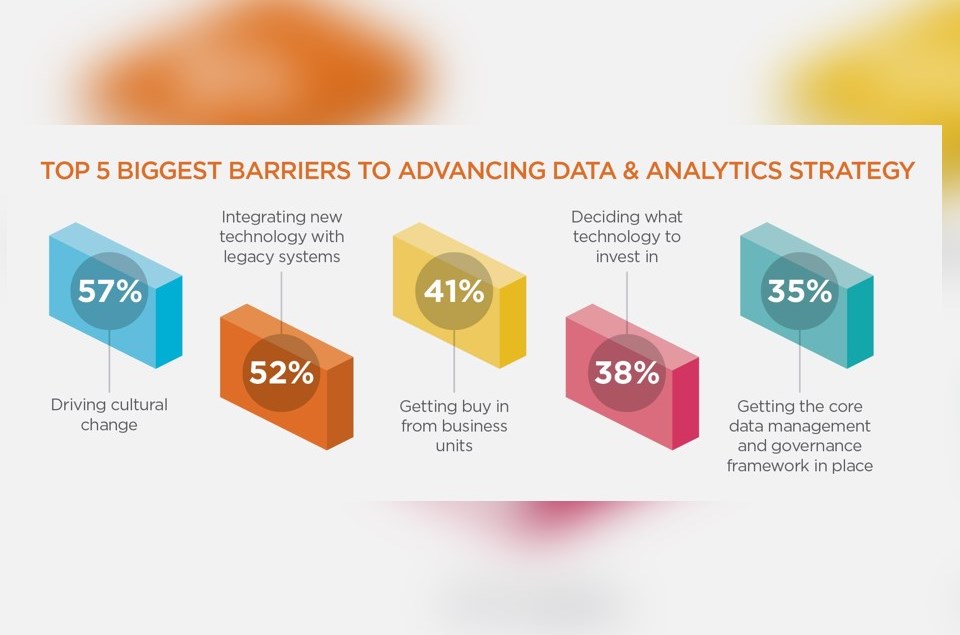Given the changing nature and the evolving role of the Chief Data Officer within the US Government, I recently connected with Kelly Tshibaka, Chief Data Office at the United States Postal Service to find out her thoughts on where the role is heading, what challenges she is facing and her predictions for the future.
Douglas Leach: What do you see as the biggest challenges for the 2018 Data & Analytics Leader community?
Kelly Tshibaka: I see three distinct challenges:
The first challenge is that CDAOs tend to be on the forefront of culture change in their respective agencies, which usually means that they can be at odds with and/or run into resistance from other executives and leaders within the agency, even though they are a necessary part and component of the agency. The agency wants them driving culture change, and with that change comes resistance, and that will continue to be a challenge—especially if it’s not anticipated or recognized that that is one of the roles of the CDAO.
The second challenge is to keep pace with the trends of the evolving data analytics field. What was cutting edge a year ago is not cutting edge now, and getting our organizations and our staff to stay on the cutting edge of analytics and keep with the emerging trends is a challenge.
The third challenge is the recruitment and retention of top talent because we are in a data analytics boom and there are a limited number of people who can offer a lot of value in this area. We are competing with private companies for them, and with the salaries that we can offer and in the locations where we are, this will remain a challenge. We are continuing to look for people who have the skill sets that we need and can leverage those skills in a public service environment.
DL: How accepted is the CDAO Role at the top table within agencies? Will we see CDAOs becoming CEOs anytime soon?
KT: I think it depends on the agency. At our agency this role is very much embraced, accepted, and supported. In my experience, the agencies that embrace, accept and are supportive of analytics and CDAOs tend to be more innovative, more flexible, and outside-the-box thinking agencies. So there is probably a correlation between the level of acceptance and the level of tolerance for innovation, creativity, and flexibility. Will we see more CDAOs becoming CEOs anytime soon? It probably depends on the CDAO. I don’t think the two positions are a natural complement or overlap in their skill sets.
I imagine that there are some CDAOs who are natural executives—they are good at leading the operations of large agencies, or making big strategic decisions and being the external face and spokesmen for their companies. But generally, CDAOs seem really good at understanding data operations and how data can be used to inform those decisions and assist in leading their agencies where they are going. I think they usually use a different skill set; therefore, I think it would depend on the person. I think that it would be a mistake to think that just because some of these CDAOs are good at being CDAOs, that they would naturally be a good fit to lead an entire agency or company.
DL: What are the biggest misconceptions about your role and the challenges you face?
KT: One of biggest misconceptions that I face is that all CDAOs perform the same tasks and operate in the same manner. I haven’t encountered one CDAO that does the same things or operates in the same way as another. This is a new field and for the companies and agencies that are exploring with the role of CDAO, I think it would be to their benefit to realize everybody’s use of data analytics is different.
I think another misconception is about what this job is. I sense that a lot of people envision that I’m like a giant data scientist who sits in a room filled with electronic spreadsheets, data sets, data systems –flooded with data– and that I am the one that just goes around telling people what the data means. Instead, one of the things that I really enjoy doing is changing the way people think about data, showing them what they could do with data, and helping them realize that the possibilities are limitless. Data is transforming how we do our business, what we are doing, and how we are making decisions. Reframing the way people think about the assets that they are sitting on, how rich it is, and what they can do with it is a really exciting and significant part of my role.
DL: What is the biggest accomplishment in your career? Was this more of a technical challenge or a people challenge?
KT: I think my biggest accomplishment as the CDO of the USPS OIG is the merger of resources from across the agency to improve intelligence sharing and strengthen intra-agency collaboration. We took analysts and program Subject Matter Experts from investigations and audit and combined them into CDO, which already included people dedicated to developing and maintaining data analytics tools. The new team is now identifying and analyzing important and emerging issues and trends across the OIG. It is increasing awareness across the OIG of high profile investigations and audits, while simultaneously continuing to provide high impact support to fieldwork.
We have already experienced significant successes, resulting in billions of dollars in cost-savings and cost avoidances. With this recent merger, we have been making exciting new discoveries in international mail data and retail operations, which is really helping position us to become a data-driven agency, not just a data supported agency.
DL : How do you see this role evolving over the next 5 years?
KT: Over the next 5 years, I think for my role as CDO of the USPS OIG, I see us getting into more complex problems that have a greater impact, like how can we use data to assist in stopping illegal trafficking of opioids through the mail.
I see CDAOs being on the forefront of developing more inter-agency collaboration, not just intra-agency collaboration. It will be imperative for me to work with other CDAOs and other agencies because data is neutral—it shouldn’t belong to one agency or one person. If we could use data collected across the government to make smart decisions and engage more in prevention and deterrence, which is better than using data to catch things after the fact, it will create a more efficient government. Just like with medicine, an ounce of prevention is worth a pound of cure. I think that is the future of data analytics. I can easily envision working groups and task forces being set up across government agencies that are using data analytics collectively to solve broader problems that are bigger than just one agency.
Kelly will be presenting at The Chief Data & Analytics Officer Government 2018 event this May. To find out more about the event, including the agenda and full speaker line-up – click here.








